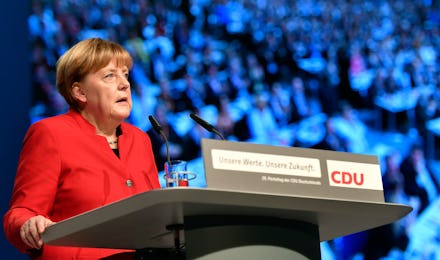Angela Merkel calls for burqa ban in bid for reelection

In an address on Tuesday at the Christian Democrats party conference, German Chancellor Angela Merkel called for a burqa ban in her bid to be reelected the country's chancellor in a fourth term.
"The full-face veil is not acceptable in our country," Merkel told the crowd, according to the Independent. "It should be banned, wherever it is legally possible."
Merkel's pitch for a ban on the Islamic religious garb echoes those of the Christian Democrat party more broadly, members of which have called for similar restrictions in the past. In August, Peter Tauber, the party's general secretary, said the the full-face veil was "contrary to integration," the Independent reported. At the time, German interior minister Thomas de Maiziere said such a ban would be "constitutionally problematic," and a possible violation of Germany's laws on religious freedom.
Germany's Basic Law maintains the "the undisturbed practice of religion shall be guaranteed," with no specific mention of religious dress.
However, Merkel's latest call for a burqa ban runs alongside her focus on the refugee crisis and amid Germany's fluctuating attitudes toward accepting refugees into the country.
"A situation like the one in the late summer of 2015 cannot, should not and must not be repeated," Merkel said on Tuesday. "That was and is our, and my, declared political aim."
The Independent suggested Merkel was referring to September 2015, when she drew criticism for opening Germany's borders. Later, many blamed Merkel for a string of New Year's Eve sexual assaults and robberies that many alleged had been perpetrated by refugees. (According to a February report from the Independent, three of the 58 men arrested for the mass attack were refugees from Syria or Iraq.)
Merkel condemned the attacks, promising to ensure the country's deportation system was fully functional.
"There are some very serious questions which arise from what has happened which have relevance beyond Cologne," she said at the time, according to Reuters. The outlet reported Merkel had alluded to "establishing whether there are common patterns of behavior by some groups of people who do not respect women" — a rather pointed dig at Muslim refugees.
Following the attacks, the chancellor also emphasized the question of "cultural coexistence," a notion that seems to underpin Merkel and her allies' insistence on a burqa ban. The true motivation behind such a policy, though, is usually more insidious, driven by a prejudice toward Islam and its religious principles.
In May, Hans-Thomas Tillschneider, a member of the anti-immigration party Alternative for Germany, said at a party debate, "Islam is foreign to us and for that reason it cannot invoke the principle of religious freedom to the same degree as Christianity." According to Reuters, a chapter of the party's manifesto reads, "Islam is not a part of Germany."
Still, Merkel called for Germany to rally behind her and her mission to unite the country. "The 2017 election for the Bundestag will be difficult like no previous election — at least since German reunification," she said on Tuesday. "You must help me."